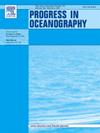OCLE: An updated of the European high-resolution database for assessing marine ecological systems under present conditions and climate change scenarios
IF 3.6
3区 地球科学
Q1 OCEANOGRAPHY
引用次数: 0
Abstract
Understanding the impacts of climate change on coastal marine species requires high- resolution environmental datasets that integrate physical, chemical, and biological variables. However, existing databases often lack key environmental parameters necessary for accurately assessing species distribution. The OCLE database (https://ocle.ihcantabria.com/), originally introduced in 2018, has now been significantly updated and expanded to address these limitations and meet current research needs in European littoral ecosystems. This new version of OCLE includes a wide range of 16 environmental variables: wave height, wind speed, currents, bottom current speed, sea level, tidal range, bottom shear stress, sea and air temperature and salinity, alongside physicochemical parameters like light, nutrients, pH, turbidity, and extreme event metrics such as marine heatwaves and cold spells. These data are provided at fine-scale spatial resolution (0.05°, approximately 5 km from the coastline up to 20 km offshore; and 0.1°, approximately 10 km beyond this distance to 70 Km) and temporal resolution (yearly from 2000 to 2023), ensuring an accurate representation of local and regional oceanographic processes. In addition, the database incorporates biological records of 22 macroalgae taxa, enhancing its applicability in species distribution models. To support climate impact assessments, OCLE integrates projections from the latest IPCC AR6 scenarios (SSP2-4.5 and SSP5-8.5) for the horizon years 2050 and 2100, allowing researchers to explore potential future shifts in marine ecosystems. By offering freely accessible, spatially homogeneous, and high-resolution environmental data, OCLE represents a major advancement for ecological research, conservation planning, and climate change adaptation strategies. Its integration into ecological forecasting tools provides a valuable resource for assessing the effects of changing environmental conditions on European coastal biodiversity.

OCLE:欧洲高分辨率数据库的更新版,用于评估当前条件和气候变化情景下的海洋生态系统
了解气候变化对沿海海洋物种的影响需要整合物理、化学和生物变量的高分辨率环境数据集。然而,现有数据库往往缺乏准确评估物种分布所需的关键环境参数。OCLE数据库(https://ocle.ihcantabria.com/)最初于2018年推出,现已进行了重大更新和扩展,以解决这些限制并满足当前欧洲沿海生态系统的研究需求。新版本的OCLE包括16个环境变量:浪高、风速、洋流、海底洋流速度、海平面、潮汐差、海底切变应力、海洋和空气温度和盐度,以及光、营养、pH、浊度等物理化学参数,以及海洋热浪和寒流等极端事件指标。这些数据以精细尺度空间分辨率(0.05°)提供,从海岸线约5公里到离岸20公里;和0.1°,在此距离以外约10公里至70公里)和时间分辨率(2000年至2023年每年一次),确保准确表示当地和区域海洋过程。此外,该数据库还收录了22个大型藻类类群的生物记录,增强了其在物种分布模型中的适用性。为了支持气候影响评估,OCLE整合了IPCC AR6最新情景(SSP2-4.5和SSP5-8.5)对2050年和2100年的预估,使研究人员能够探索海洋生态系统未来的潜在变化。通过提供可免费获取、空间同质和高分辨率的环境数据,OCLE代表了生态研究、保护规划和气候变化适应战略的重大进步。它与生态预测工具的结合为评估环境条件变化对欧洲沿海生物多样性的影响提供了宝贵的资源。
本文章由计算机程序翻译,如有差异,请以英文原文为准。
求助全文
约1分钟内获得全文
求助全文
来源期刊

Progress in Oceanography
地学-海洋学
CiteScore
7.20
自引率
4.90%
发文量
138
审稿时长
3 months
期刊介绍:
Progress in Oceanography publishes the longer, more comprehensive papers that most oceanographers feel are necessary, on occasion, to do justice to their work. Contributions are generally either a review of an aspect of oceanography or a treatise on an expanding oceanographic subject. The articles cover the entire spectrum of disciplines within the science of oceanography. Occasionally volumes are devoted to collections of papers and conference proceedings of exceptional interest. Essential reading for all oceanographers.
 求助内容:
求助内容: 应助结果提醒方式:
应助结果提醒方式:


